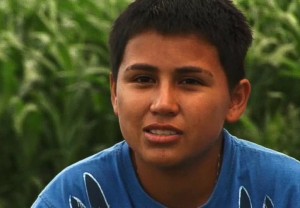The Children’s Act for Responsible Employment (CARE Act) would help protect child farmworkers
Grecia Balli began working in farm fields when she was 10 years old. At age 14, she decided to drop out of school because her life as a migrant farmworker caused her to switch schools frequently, making it difficult for her to keep up academically. By age 17 she no longer dreamed of becoming a police officer, which had been her goal. Her life revolved around farm work.
Grecia is one of an estimated 400,000 to 500,000 children who work in U.S. agriculture. Interviewed for “Fingers to the Bone,” a film by U. Roberto Romano and Human Rights Watch, Grecia said she felt as though she had no choices as a farmworker. “You don’t feel the same as other kids.”
Child farmworkers aren’t treated the same as other children, either, under current U.S. labor laws. Seventy-five years after its passage, the antiquated Fair Labor Standards Act (FLSA) of 1938 continues to regulate child labor, but fails to provide children performing agricultural work with protections equal to those afforded other children. The FLSA restricts children younger than 16 years from working for more than three hours on a school day, but a loophole for the agricultural sector means children as young as 12 can legally work unlimited hours on farms before or after school, and children of any age can work on small farms, with their parents’ permission. Children 14 and older can work on any farm, without parental consent. Child agricultural workers are also permitted to perform hazardous work at age 16, while hazardous work is strictly reserved for adults in all other sectors.
Agriculture is one of the most dangerous industries and the most dangerous for children, according to U.S. Department of Labor statistics. “Children working for wages on farms are exposed to many hazards—farm machinery, heat stroke, and pesticides among them—and they perform back-breaking labor that no child should have to experience,” says Child Labor Coalition (CLC) Co-Chair Sally Greenberg, the executive director of the National Consumers League, a consumer advocacy organization that has worked to eliminate abusive child labor since its founding in 1899. “Child farmworkers deserve the same protections that all other American kids enjoy.”
As Grecia’s story illustrates, schooling is also negatively impacted when children labor in agriculture. Many of them leave school before the term ends and return after it has begun. This can lead to academic difficulties. American Federation of Teachers Secretary-Treasurer and CLC Co-Chair Lorretta Johnson notes, “Fifty percent of children who regularly work on farms will not graduate from high school.” Child farmworkers have four times the national rate of school drop-out.
For more than a decade, the CLC has endeavored to address the issue of child agricultural labor and is working to help pass the Children’s Act for Responsible Employment (CARE), HR 2234, federal legislation re-introduced on June 12, 2013, by Representative Lucille Roybal-Allard (D-CA) to amend the FLSA.
The CARE Act would close loopholes that permit children under age 14 to work in the agricultural industry (unless working on a family farm or for their parents). The new legislation would require the U.S. Secretary of Labor to determine the specific types of farm work that are safe enough for 14- and 15-year-olds and it would restrict those under age 18 from performing hazardous farm work. Regulations protecting children from pesticide exposure would also be strengthened.
Grecia Balli says it’s difficult to know that she has not been able to take advantage of the opportunities and freedoms that her parents came to the United States to provide for their children, but hopes she will be able to “later on.” Although Grecia only has a grade 8 education she says, “I still have esperanza [hope].”
By offering children who work in agriculture the same protections as other child laborers, the CARE Act would ensure that the kinds of opportunities and freedoms other children enjoy aren’t something that child farmworkers can only hope for.
The CARE Act has been regularly introduced in Congress since 2001. It has had as many as 107 co-sponsors and more than 150 national and state groups have endorsed the legislation, but so far Congress has refused to vote on the bill. We urge readers to write their members of Congress at www.house.gov and www.senate.gov and urge them to enact the CARE Act, HR 2234.
CLC Intern Sharon Fawcett wrote this article.


